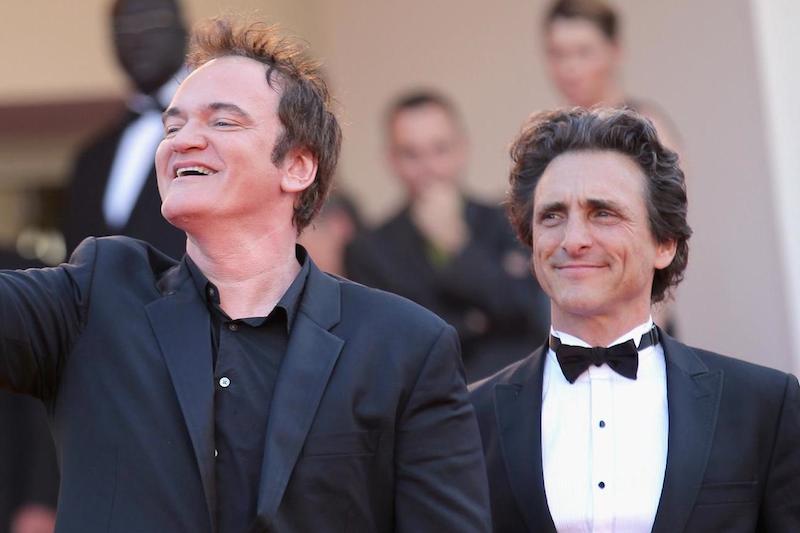In “Roger’s Favorites,” we highlight the filmmakers and actors that Roger championed throughout his career. A table of contents for all of our “Roger’s Favorites” posts can be found here. Below is an entry on director Quentin Tarantino and producer Lawrence Bender.
When Roger first encountered the work of Quentin Taranatino in his 1992 directorial debut, “Reservoir Dogs,” he didn’t know quite what to make of it. He felt that the director didn’t do much with his characters, aside from let them talk far too much. Roger awarded the film two-and-a-half stars, and began his review by observing, “Now that we know Quentin Tarantino can make a movie like ‘Reservoir Dogs,’ it’s time for him to move on and make a better one.”
Perhaps Tarantino was listening, considering that his next film, “Pulp Fiction” (1994), proved to be a watershed. Looking back on the film in his 2001 Great Moves essay, Roger declared it as “the most influential film of the decade,” in part because of its “circular timeline.” He praised Tarantino’s use of seemingly “irrelevant conversation” to convey vital plot details and characterization. Roger felt the dialogue was “load-bearing” and “the foundation of everything else.” He also said the dialogue warranted comparison with the prose of Raymond Chandler and Elmore Leonard. “Like them, QT finds a way to make the words humorous without ever seeming to ask for a laugh,” Roger wrote.
Yet it was the filmmaker’s follow-up, “Jackie Brown” (1997), that proved to Roger that “Tarantino is the real thing, and not just a two-film wonder boy.” In his four-star review, he said that viewers who complained that the film dragged on too long, or that there was too much dialogue, suffered from “cinematic attention deficit disorder. I wanted these characters to live, talk, deceive and scheme for hours and hours.” He singled out a particular scene of dialogue between Robert De Niro and Bridget Fonda that was “so perfectly written, timed and played that I applauded it.”
Though Tarantino divided many fans with his next film, “Kill Bill: Vol. 1” (2003), it received four stars from Roger, who said that Tarantino was “so effortlessly and brilliantly in command of his technique that he reminds me of a virtuoso violinist racing through ‘Flight of the Bumble Bee,’” even though the film didn’t prove to be about very much at all. The story and substance lacking from “Vol. 1” turned up with a vengeance in “Kill Bill: Vol. 2” (2004), which Roger felt deepened the saga as a whole. He gave the film four stars and hailed Tarantino as “the most brilliantly oddball filmmaker of his generation.”
When it came time for Roger to review Tarantino’s “audacious war movie,” “Inglourious Basterds” (2009), he reflected on how the director had approached him immediately after he had first seen “Pulp Fiction” at Cannes back in 1994. Roger told him, “It’s either the best film of the year or the worst film,” and admitted to his readers, “I hardly knew what the hell had happened to me. […] Tarantino films have a way of growing on you.” After withholding judgment regarding “Basterds,” which he also saw upon its Cannes debut, Roger gave the film four stars, calling Tarantino “a director of quixotic delights,” and praising actor Christoph Waltz for creating “a character unlike any Nazi—indeed, anyone at all—I’ve seen in a movie.”
Though Roger never wrote an official review of “Django Unchained” (2012), he did pen an in-depth blog about the film, which served as his four-star review. He said that the film was “brilliant entertainment” that displayed an artistic desire to transform its exploitative appeal into something more daring. “His films challenge taboos in our society in the most direct possible way, and at the same time add an element of parody or satire,” Roger wrote.
“Basterds” marked the end of Tarantino’s collaboration with Lawrence Bender, though the producer is currently attached as a producer on the in-development “Kill Bill: Vol. 3,” according to IMDb.com. Other notable highlights of Bender’s producing career include Gus van Sant’s Oscar-winner, “Good Will Hunting.” Roger gave the film three stars, and said that the screenplay by Ben Affleck and Matt Damon had “a good ear for the way these characters might actually talk.” Bender also produced Davis Guggenheim’s Oscar-winning 2006 documentary on climate change, “An Inconvenient Truth,” which earned an unprecedented response from Roger in his four-star review. “In 39 years, I have never written these words in a movie review, but here they are: You owe it to yourself to see this film,” Roger wrote. “If you do not, and you have grandchildren, you should explain to them why you decided not to.”











